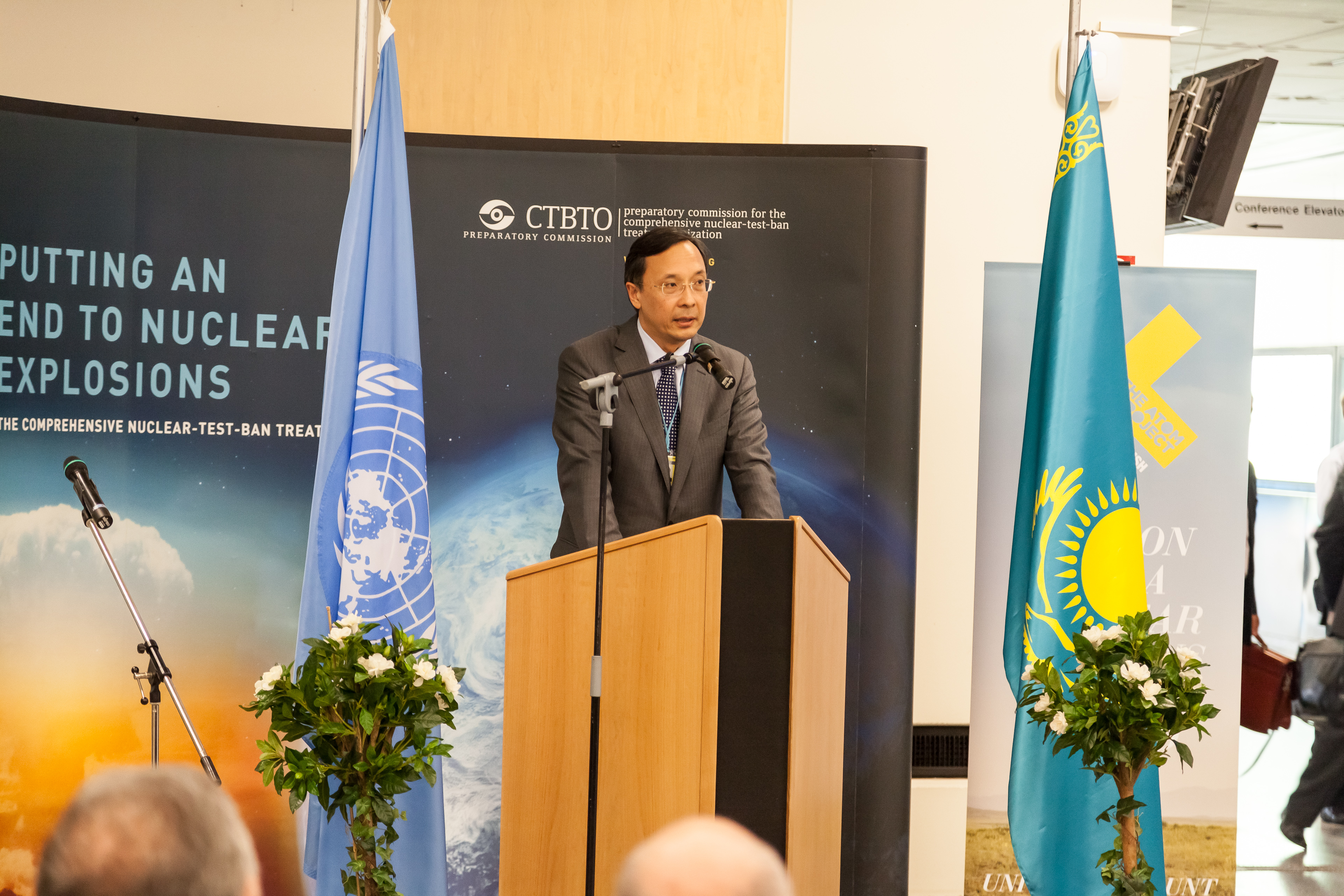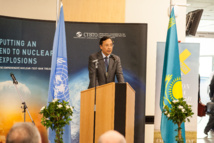The signing ceremony was attended by representatives of states - the permanent members of the UN Security Council, including Britain, China, Russia, US and France, as well as the donor of the project - the EU, Norway, Kuwait and the United Arab Emirates. However, Kazakhstani experts do not yet know whether to wait for the benefits from the project, or, alternatively, an international nuclear waste repository will emerge under the beautiful guise in the country. Moreover, issues related to the Bank arose even among the group of deputies of German Bundestag, who has sent a request to the German government on the occasion.
Questions to the bank
This is about the repository of weakly radioactive uranium hexafluoride. Hexafluoride containing uranium isotope U-235 not more than 5 percent is a versatile semi-finished product from which one can produce the nuclear fuel suitable for different types of nuclear reactors used in the world. The Kazakhstan Bank is planed to store up to 90 tonnes of LEU.
The Bank will belong to the IAEA, yet will be financed by voluntary contributions from sponsors. We are talking about $ 150 million, which will be provided by ‘Nuclear Treat Initative’ Fund headquartered in Washington, the US government (these two sponsor allocate almost two thirds of the required amount), the EU (25 million), the United Arab Emirates and Kuwait (10 million) and Norway ($ 5 million).
According to IAEA’s calculations, this amount should be sufficient to finance the LEU bank project for ten years. In 2010, IAEA decided to establish such a bank in order "to protect the country, using peaceful atom, from supply disruptions in their nuclear fuel, caused by technical or political reasons", as explained to the deputies of the Bundestag by the German government in its reply, dated 10 August 2015.
LEU at IAEA’s disposal
- This refers to countries, which do not have their own uranium enrichment technologies. Availability of LEU bank should save them from temptation of learning to enrich uranium, which could be used by them in the military purposes as external control of the enrichment phase is very difficult, - says the expert of the CSRC Maltese Crisis Research Center Natalia Kharitonova.
At the same time, she clarifies, Kazakhstan will provide only infrastructure services, and LEU itself will be at IAEA’s disposal - so more accurately, the project could be called not a bank, but the depositary.
In turn, the IAEA officer on condition of anonymity said that Iran, fearing that its nuclear work can be difficult due to "the external political factor", was in favor of the project. USA, the UAE and Qatar actively supported the Bank's funding, not least due to the desire to hold the Iranian atom under control of Dollar.
Nuclear dump, or element of security?
The IAEA will buy uranium hexafluoride for the bank in the world market of nuclear fuel. Kazakhstan offered a choice of two places to create LEU on its territory, and in late 2011, the IAEA chose UMP. There were no other candidate countries for the establishment of the LEU bank on its territory – says German Government.
This alarmed environmentalists. "In the documents we have seen, it is not clearly spelled out where the nuclear fuel, received by a country from the bank, will go once it’s used. We are not sure that Kazakhstan will not get the nuclear waste back. We do not want to become a nuclear dump for the whole world,"- Secretary of the Eurasian Association of Green Parties Serikzhan Mambetalin said in an interview with DW. At the same time, he points out that Kazakhstan will not even receive monetary compensation for possession of LEU.
The project is beneficial for Astana, says Natalia Kharitonova. "The bank will host 60 seats for uranium hexafluoride. This is the amount required to load or maintain the operation of VVER-1000 - the most common type of nuclear reactor in the world today - within three years", - she explains.
source: dw.de
Questions to the bank
This is about the repository of weakly radioactive uranium hexafluoride. Hexafluoride containing uranium isotope U-235 not more than 5 percent is a versatile semi-finished product from which one can produce the nuclear fuel suitable for different types of nuclear reactors used in the world. The Kazakhstan Bank is planed to store up to 90 tonnes of LEU.
The Bank will belong to the IAEA, yet will be financed by voluntary contributions from sponsors. We are talking about $ 150 million, which will be provided by ‘Nuclear Treat Initative’ Fund headquartered in Washington, the US government (these two sponsor allocate almost two thirds of the required amount), the EU (25 million), the United Arab Emirates and Kuwait (10 million) and Norway ($ 5 million).
According to IAEA’s calculations, this amount should be sufficient to finance the LEU bank project for ten years. In 2010, IAEA decided to establish such a bank in order "to protect the country, using peaceful atom, from supply disruptions in their nuclear fuel, caused by technical or political reasons", as explained to the deputies of the Bundestag by the German government in its reply, dated 10 August 2015.
LEU at IAEA’s disposal
- This refers to countries, which do not have their own uranium enrichment technologies. Availability of LEU bank should save them from temptation of learning to enrich uranium, which could be used by them in the military purposes as external control of the enrichment phase is very difficult, - says the expert of the CSRC Maltese Crisis Research Center Natalia Kharitonova.
At the same time, she clarifies, Kazakhstan will provide only infrastructure services, and LEU itself will be at IAEA’s disposal - so more accurately, the project could be called not a bank, but the depositary.
In turn, the IAEA officer on condition of anonymity said that Iran, fearing that its nuclear work can be difficult due to "the external political factor", was in favor of the project. USA, the UAE and Qatar actively supported the Bank's funding, not least due to the desire to hold the Iranian atom under control of Dollar.
Nuclear dump, or element of security?
The IAEA will buy uranium hexafluoride for the bank in the world market of nuclear fuel. Kazakhstan offered a choice of two places to create LEU on its territory, and in late 2011, the IAEA chose UMP. There were no other candidate countries for the establishment of the LEU bank on its territory – says German Government.
This alarmed environmentalists. "In the documents we have seen, it is not clearly spelled out where the nuclear fuel, received by a country from the bank, will go once it’s used. We are not sure that Kazakhstan will not get the nuclear waste back. We do not want to become a nuclear dump for the whole world,"- Secretary of the Eurasian Association of Green Parties Serikzhan Mambetalin said in an interview with DW. At the same time, he points out that Kazakhstan will not even receive monetary compensation for possession of LEU.
The project is beneficial for Astana, says Natalia Kharitonova. "The bank will host 60 seats for uranium hexafluoride. This is the amount required to load or maintain the operation of VVER-1000 - the most common type of nuclear reactor in the world today - within three years", - she explains.
source: dw.de



















